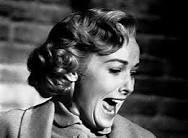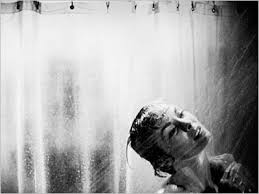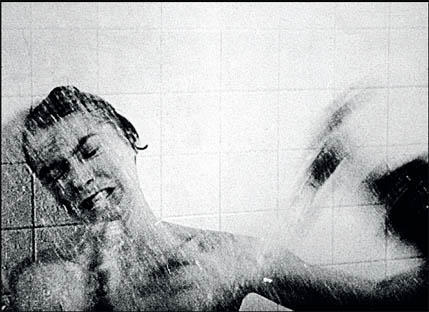“I think I must have one of those faces you can't help believing.”
Ever since I first watched Psycho I have always asked myself the question of why this film is so great. After seeing several Hitchcock films such as Rebecca, Notorious, Spellbound, To Catch a Thief, and several others I still could not understand the big deal with Psycho. Then I realized for the most part that like any classic movie to truly appreciate it you need to look at the time period it was made in… and do a little bit of research along the way.
One of the big questions about Psycho is what makes this film so scary? We look today at what is considered “horror” often with half naked women running around as a crazed guy in a mask runs through the woods chasing them with a blade. Modern horror movies do not grip us psychologically. The bad guys are scary to look but that is about all they are not real and we know that. Psycho is what makes Alfred Hitchcock a genius he made a genuine horror movie that was realistic in its subject. What unnerves us as the viewers so much is knowing that men like Norman Bates exist in the real world and that what happens to Marion Crane could happen to anyone.
Paranoia plays a major role in the film. All the main characters go through a state of paranoia. The point when Marion steals the money the characters and the audience are put into a constant state of paranoia. It is a great device and feeling that other “thrillers” severely lack. We get into Marion’s paranoia over the simplest things. As she drives away from Phoenix after she has seen her boss she starts to imagine what everyone must be saying about her. We see her squirming in her seat and fear in her eyes. Marion feels paranoid believing someone besides her coworkers know what she has done and this feeling intensifies when the cop knocks on her car window. Even Norman becomes paranoid when his sinks Marion’s car with her body in it and it stops a bit before it submerges completely. The killer starts to unravel with paranoia when Detective Arbogast and Lila Crane and Sam start coming around asking questions. We are lead to feel for Marion we want her to get away. Even though Norman is a bad guy we take a deep breath in anxiety hoping the car will go down so he will not be caught. To me the best example of paranoia and fear is when Lila is walking through Norman's mother's room and she catches her reflection in the mirror really quick and scares herself. That was awesome it shows how on edge she was and also broke the tension somewhat.


No analysis of Psycho would be complete without talking of the most famous scene in cinematic history: the shower scene. If you can look at this scene deeply it is truly terrifying and genius. Hitchcock played on the fact that we are at our most vulnerable when we are naked alone in the shower. Marion’s privacy and vulnerability has been brutally invaded. This is what shocked and disturbed so many movie goers when the film premiered. Hitchcock also used the idea that what you do not see is scarier than what you do see. We never see the knife plunge into Marion the camera quickly cuts away before we see contact. At the end of the brutal commotion is a great transition from the water flowing down the drain to Marion’s open dead eye. Truffaut asked Hitchcock what attracted him to turn the novel Psycho is based off of into a movie to which the director replied “the suddenness of the murder in the shower, coming as it were, out of the blue. That was about all.”



Another aspect that shocked audience members is the killing of Janet Leigh half way through the film. This was never done before no one was expecting to see her die. This was part of Hitchcock trying to direct the viewers away from what they were so used to doing when they went to movies. As viewers we try to think we are clever and know what will happen next, he was deliberately playing on the fact that he could control the audiences’ thoughts. It is always a shock when something happens that we do not see coming.
Adding as much of the tension and shock is the incredible score by Bernard Herrmann. The music does not move us it is cold and sterile only played by strings. The music does not allow for any attachment emotionally to the characters which we are not truly meant to. Herrmann made the score a bit twisted; the strings are soft while being played on a high note. Hitchcock did not want a lot of music being played throughout the film, he did not even want music in the shower scene mostly because there is not instrumental music playing all around someone in real life. Once he heard the score for the scene Hitchcock changed his mind.
Now I do appreciate Psycho more than I used to once I read about it and watched in a film class I took but I will have to disagree that this is Hitchcock’s greatest film. Yes it has left a very long and fantastic legacy on film making but I just do not see it as the director’s best. It is a very good story because it strikes a nerve it is something that could happen it could be real. I will say the film making is the best I have ever seen I will always be amazed by the cinematography and the direction. To me Psycho is just not as good as Hitchcock’s early American films.
When Hitchcock was interviewed by François Truffaut about Psycho, the director said that he did not care about the subject matter or about the acting what he really cared about was getting to the audience through filmmaking and making them scream. He made this thriller for the audience. Even after its release fifty-one years ago audiences are still left amazed and terrified.

No comments:
Post a Comment